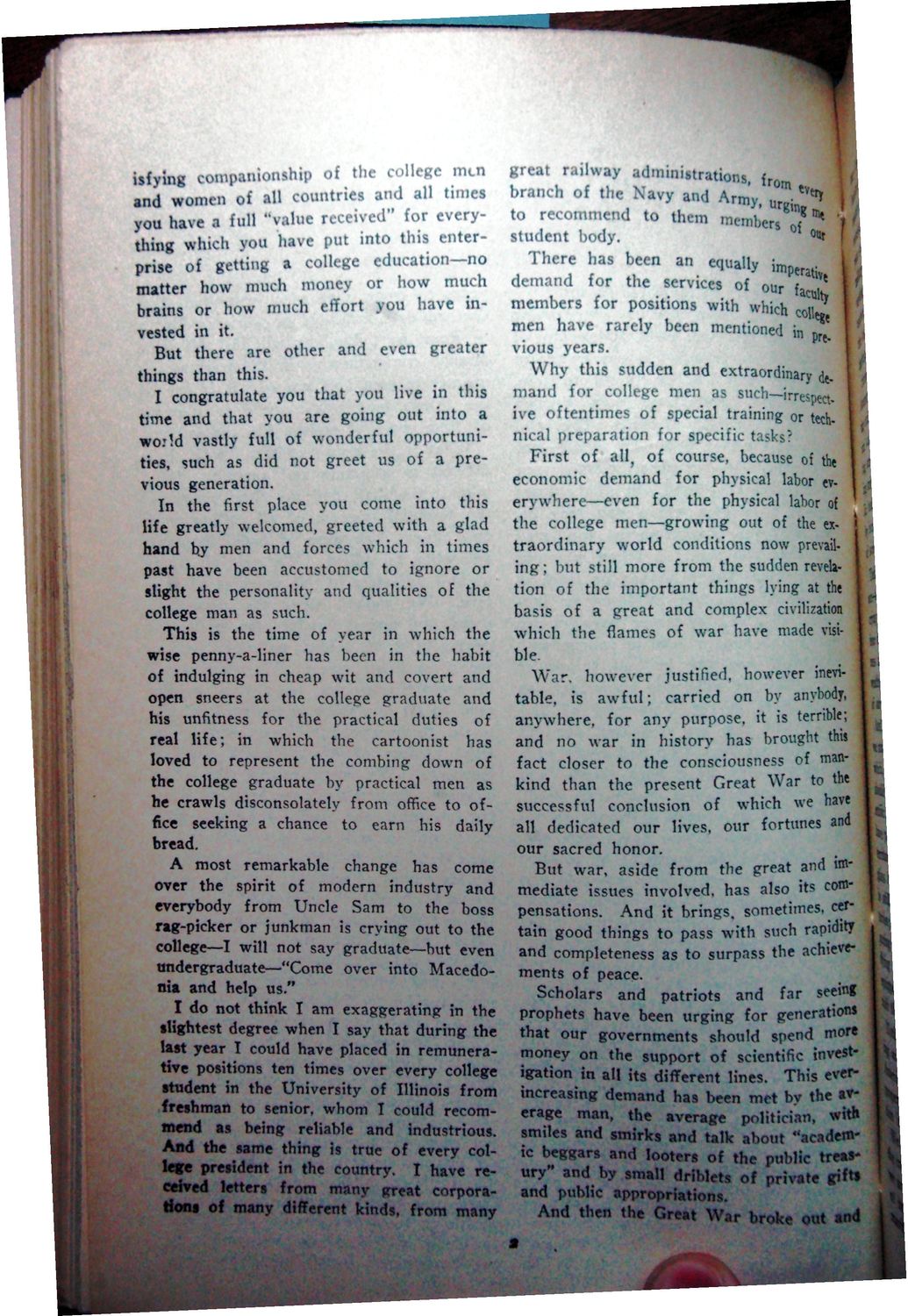| |
| |
Caption: War Publications - WWI Compilation 1923 - Article 17
This is a reduced-resolution page image for fast online browsing.

EXTRACTED TEXT FROM PAGE:
isfying companionship of the college men and women of all countries and all times you have a full "value received" for everything which you have put into this enterprise of getting a college education—no matter how much money or how much brains or how much effort you have invested in it. But there are other and even greater things than this. I congratulate you that you live in this time and that you are going out into a •wo ;!d vastly full of wonderful opportunities, such as did not greet us of a previous generation. In the first place you come into this life greatly welcomed, greeted with a glad hand b.y men and forces which in times past have been accustomed to ignore or slight the personality and qualities of the college man as such. This is the time of year in which the wise penny-a-liner has been in the habit of indulging in cheap wit and covert and open sneers at the college graduate and his unfitness for the practical duties of real life; in which the cartoonist has loved to represent the combing down of the college graduate by practical men as he crawls disconsolately from office to office seeking a chance to earn his daily bread. A most remarkable change has come over the spirit of modern industry and everybody from Uncle Sam to the boss rag-picker or junkman is crying out to the college—I will not say graduate—but even undergraduate—"Come over into Macedonia and help us." I do not think I am exaggerating in the •lightest degree when I say that during the last year I could have placed in remunerative positions ten times over every college •tudent in the University of Illinois from freshman to senior, whom I could recommend as being reliable and industrious. And the same thing is true of every college president in the country. I have received letters from many great corporations of many different kinds, from manv great railway administrations fro ev branch of the Navy and Army, Ur * *> 1 to recommend to them members 01 * ' l? student body. °*r There has been an equally inip demand for the services of our fa , members for positions with which coll^ men have rarely been mentioned in p * V vious years. Why this sudden and extraordinary de4 mand for college men as such—irrespect. V ive oftentimes of special training or technical preparation for specific tasks? First of all, of course, because of the I economic demand for physical labor ev4 erywhere—even for the phvsical labor of the college men—growing out of the ex- 1 traordinary world conditions now prevailing; but still more from the sudden revelation of the important things lying at the basis of a great and complex civilization which the flames of war have made visi- ri ble War, however justified, however inevitable, is awful; carried on by anybody, anywhere, for any purpose, it is terrible; i and no war in history has brought this ii fact closer to the consciousness of mankind than the present Great War to the 4 successful conclusion of which we have all dedicated our lives, our fortunes and our sacred honor. But war, aside from the great and immediate issues involved, has also its compensations. And it brings, sometimes, certain good things to pass with such rapidity and completeness as to surpass the achievements of peace. and far seeing Scholars and patriots . -— prophets have been urging for generations that our governments should spend more money on the support of scientific investigation in all its different lines. This everincreasing demand has been met by the average man, the average politician, with i smiles and smirks and talk about "academ* ic beggars and looters of the public treasury" and by small drihlets of private gifts and public appropriations. And then the Great War broke out and r \ % l \ *
| |